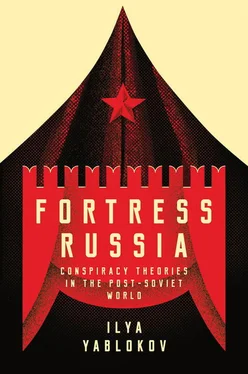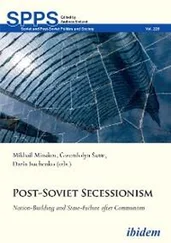These powerful descriptions – of Ukraine as Russia’s enemy, alien to the Russian nation, and of the new Ukrainian leadership, as under the control of the USA – were aimed at supporting the mainstream conspiracy theories. Ukraine’s inability to protect its own independence, along with its new leadership’s readiness to cooperate with Russia’s rival, alienated Ukraine from the ‘Russian people’ and ensured that any cooperation with Ukraine would be regarded as national betrayal. Although Ukraine might seem to be a rather weak enemy in comparison with the economic and military might of Russia, various rhetorical tools were deployed to frame Ukraine as an external and dangerous ‘Other’. In addition, the accusation on the part of the Russian leadership that the new Ukrainian authorities were allies of the USA served as justification for Russia’s annexation of Crimea (Krym. Put’ na rodinu, 2015). The state-aligned media and Russian politicians carried out a metaphorical division of the world, into nations which were allied to Russia, and those which were not; this was based on their relations with the USA.
The ‘Selfish’ Minority vs. The ‘Patriots’
The dramatic division of Russian society into those who opposed both the annexation of the Crimea in March 2014 and Russia’s military involvement in the Ukraine crisis, and those who supported them, became key to the increased popularity of Putin’s policies during his third presidential term. Claiming the existence of a potentially disloyal minority whose political views radically differed from those of the majority of Russians who supported the regime, was a useful and clever move on the part of the Kremlin to justify its aggressive foreign policy and new authoritarian legislation by generating fear of domestic subversion. Putin himself contributed to this several times by making conspiratorial allusions about the opposition, which eventually developed into the supposed division between the loyal and supportive majority and the ‘dangerous minority’ supported by the West. He first spoke about the opposition in a key speech when the Crimea was accepted as a new Russian region in March 2014:
Some Western politicians are already threatening us with not just sanctions but also the prospect of increasingly serious problems on the domestic front. I would like to know what it is they have in mind exactly: action by a fifth column, this disparate bunch of ‘national traitors’, or are they hoping to put us in a worsening social and economic situation so as to provoke public discontent? We consider such statements irresponsible and clearly aggressive in tone, and we will respond to them accordingly. (Putin, 2014)
The response on the part of the Russian authorities’ state-aligned media and pro-state activists to dissenting views regarding Crimea and rebellious regions in Eastern Ukraine was swift and harsh. Many reports, websites and editorials about the opposition – disparate, corrupt, self-interested, loyal to the West – skyrocketed. Given the spike in Putin’s popularity and the overwhelming support for his policies, it was not hard for various pro-state speakers to emphasize how small and alien the opposition was. Russian media and various pro-Kremlin speakers applied derogatory labels to those who were against the annexation of Crimea in March 2014: ‘intelligentura’ (a fusion of the Russian words intelligentsia and agency), the ‘fifth column’, ‘traitors’, ‘aliens’ (Kiselev and Rozhkov, 2014a). In addition, unknown Putin activists created a website under the title ‘National traitors. The 5th column’ that collected the names of all opposition activists and politicians critical of Russia’s Ukraine policies ( Natsional-predateli Rossii . 5-ia kolonna ). The reaction to those who did not support the authorities has been harsh and aggressive, at least on the rhetorical level. Russian writer and politician Eduard Limonov called the opposition protesters ‘lost people’ whose ‘miserable’ loneliness, affection for the West and hatred of Putin made them ‘aliens’ in the country, and they should be expelled by the authorities (Limonov, 2014). Reference to the ‘alien’ nature of the Russian opposition later appeared in a campaign to publicly criticize those individuals who opposed the confrontation with Ukraine. The poster juxtaposed an image of an alien, taken from the popular Hollywood film of that name, with pictures of Russian opposition leaders, to serve as visual evidence of the ‘otherness’ of the Kremlin’s critics (Glavplakat, 2014).
The Russian political leadership also contributed to the establishment of a conspiratorial notion of a ‘fifth column’ in official discourse. During a press conference on 18 December 2014, Putin emphasized that the ‘fifth column’ was a social force ‘totally dependent on foreign authorities and acts in their interests’; yet again, he was legitimizing the use of a conspiratorial and negatively charged term in public discourse (Izvestiia, 2014). Although the Kremlin has a very peculiar understanding of the term ‘democracy’ which tends to suit its own ad hoc needs, Putin insisted that Russia is a democratic country with an official opposition and that it would be a mistake to merge all opposition activists into a single subversive group of internal enemies. This idea was expressed by Putin in, for example, a speech to the FSB in March 2015 which was reported by Vesti Nedeli . However, the line between the ‘loyal opposition’ and the subversive ‘fifth column’ tends to be drawn according to how close a particular opposition group is to the Western Special Services (i.e. CIA) (Kiselev, 2015c).
Another major defining marker of a person’s loyalty to the nation is his or her attitude towards the economic sanctions against the Russian elites and companies. A report on 23 March 2014 about the reaction of the Russian political establishment to the first round of EU and US sanctions contrasted the unity of prominent Russian politicians with the ‘cunning’ actions of the opposition leaders, who allegedly supplied the US and EU with a list of people who would be subject to sanction. In the report’s introduction, Kiselev spoke about the limited effect of the sanctions, which, he claimed, damaged only a small circle of businessmen who were personally loyal to Putin. However, he continued, the list of people under sanction was created ‘in Moscow by our “fifth column”, which seeks the support of the West and receives it. [Publisher and journalist] Parkhomenko, [opposition leader] Navalny – these are the heroes of that circle. Let’s classify it as a result of complexes, and the absence of real popular support’ (Kiselev and Popov, 2014a). In this way the threat from outside, initiated by the USA, was projected onto the domestic political scene and used against the opposition leaders.
The report itself featured interviews with several prominent Russian politicians who praised the annexation of Crimea. Much of the report consisted of interviews with the loyal political elite which demonstrated that the majority were on the side of the Kremlin. However, the journalist also noted that US President Obama released a new list of people under sanction soon after an article by Aleksei Navalny about the sanctions was published in The New York Times . The journalist insisted that this ‘outrageous disloyalty’ on the part of the Russian opposition surprised even the Americans: ‘It is ill-mannered to criticize your own country abroad. There is a special term for the authors of the sanctions lists – “inside man”. One way to translate this is a pointed gun, another – our man (A dlia sostavitelei spiskov est’ spetsial’nyi termin – inside man. Odin perevod – navodchik, drugoi – svoi chelovek)’ (Kiselev and Popov, 2014b).
Читать дальше
Конец ознакомительного отрывка
Купить книгу












